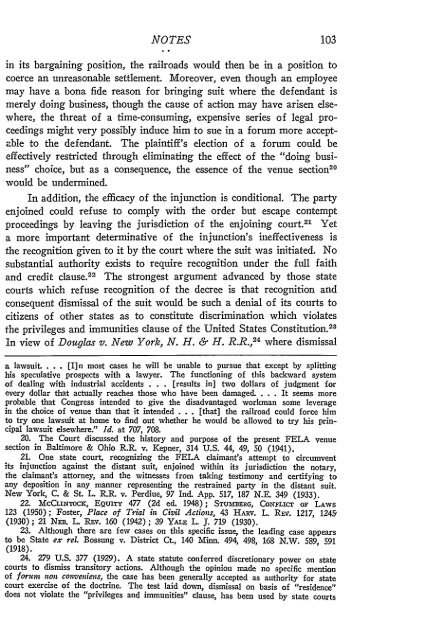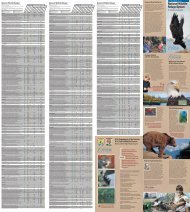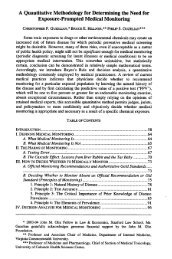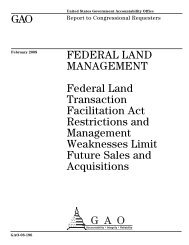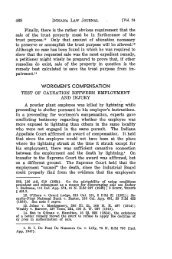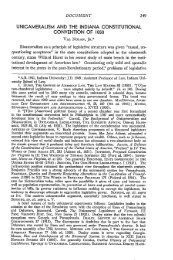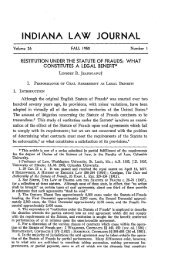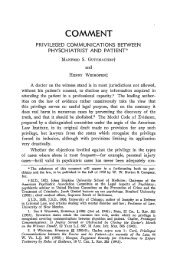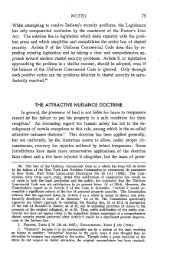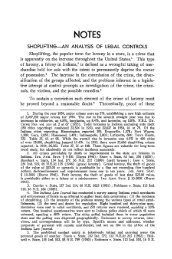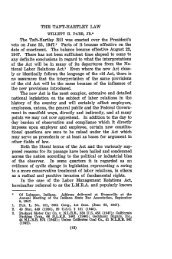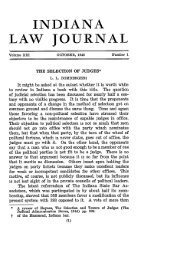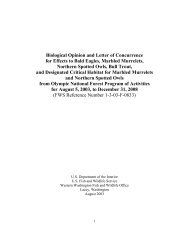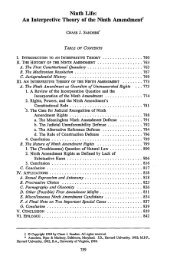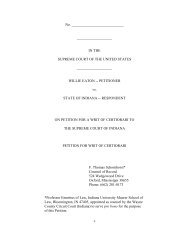fela venue abuse: necessity for congressional amendment
fela venue abuse: necessity for congressional amendment
fela venue abuse: necessity for congressional amendment
Create successful ePaper yourself
Turn your PDF publications into a flip-book with our unique Google optimized e-Paper software.
NOTES<br />
in its bargaining position, the railroads would then be in a position to<br />
coerce an unreasonable settlement. Moreover, even though an employee<br />
may have a bona fide reason <strong>for</strong> bringing suit where the defendant is<br />
merely doing business, though the cause of action may have arisen elsewhere,<br />
the threat of a time-consuming, expensive series of legal proceedings<br />
might very possibly induce him to sue in a <strong>for</strong>um more acceptable<br />
to the defendant. The plaintiff's election of a <strong>for</strong>um could be<br />
effectively restricted through eliminating the effect of the "doing business"<br />
choice, but as a consequence, the essence of the <strong>venue</strong> section 20<br />
would be undermined.<br />
In addition, the efficacy of the injunction is conditional. The party<br />
enjoined could refuse to comply with the order but escape contempt<br />
proceedings by leaving the jurisdiction of the enjoining court. 2 1 Yet<br />
a more important determinative of the injunction's ineffectiveness is<br />
the recognition given to it by the court where the suit was initiated. No<br />
substantial authority exists to require recognition under the full faith<br />
and credit clause. 22 The strongest argument advanced by those state<br />
courts which refuse recognition of the decree is that recognition and<br />
consequent dismissal of the suit would be such a denial of its courts to<br />
citizens of other states as to constitute discrimination which violates<br />
the privileges and immunities clause of the United States Constitution. 23<br />
In view of Douglas v. New York, N. H. & H. R.R., 2 4 where dismissal<br />
a lawsuit ... [I]n most cases he Will be unable to pursue that except by splitting<br />
his speculative prospects with a lawyer. The functioning of this backward system<br />
of dealing with industrial accidents . . . [results in] two dollars of judgment <strong>for</strong><br />
every dollar that actually reaches those who have been damaged. . . . It seems more<br />
probable that Congress intended to give the disadvantaged workman some leverage<br />
in the choice of <strong>venue</strong> than that it intended .. . [that] the railroad could <strong>for</strong>ce him<br />
to try one lawsuit at home to find out whether he would be allowed to try his principal<br />
lawsuit elsewhere." Id. at 707, 708.<br />
20. The Court discussed the history and purpose of the present FELA <strong>venue</strong><br />
section in Baltimore & Ohio R.1. v. Kepner, 314 U.S. 44, 49, 50 (1941).<br />
21. One state court, recognizing the FELA claimant's attempt to circumvent<br />
its injunction against the distant suit, enjoined within its jurisdiction the notary,<br />
the claimant's attorney, and the witnesses from taking testimony and certifying to<br />
any deposition in any manner representing the restrained party in the distant suit.<br />
New York, C. & St. L. R.R. v. Perdiue, 97 Ind. App. 517, 187 N.E. 349 (1933).<br />
22. MCCLINTOCK, EQUITY 477 (2d ed. 1948); STUMBEEG, CoNFLICT oF LAWS<br />
123 (1950); Foster, Place of Trial in Civil Actions, 43 H~av. L. REV. 1217, 124'<br />
(1930); 21 NEB. L. Rv. 160 (1942); 39 YALE L. J. 719 (1930).<br />
23. Although there are few cases on this specific issue, the leading case appears<br />
to be State ex rel. Bossung v. District Ct., 140 Minn. 494, 498, 168 N.W. 589, 591<br />
(1918).<br />
24. 279 U.S. 377 (1929). A state statute conferred discretionary power on state<br />
courts to dismiss transitory actions. Although the opinion made no specific mention<br />
of <strong>for</strong>um non conveniens, the case has been generally accepted as authority <strong>for</strong> state<br />
court exercise of the doctrine. The test laid down, dismissal on basis of "residence"<br />
does not violate the "privileges and immunities" clause, has been used by state courts


